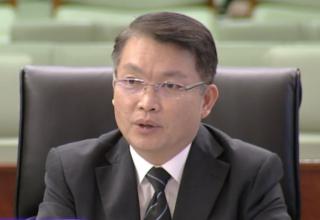No copy-paste here: Matt Hurst, Manila Bay Resorts
Jun 07, 2014 Newsdesk Features, Latest News, Philippines, Top of the deck

“It’s the commission or revenue share, and the credit. Those are the two things that junkets want to know about when they are thinking of coming to a new casino,” says Matt Hurst (pictured), executive vice president of gaming operations and marketing for the under-construction Manila Bay Resorts at Entertainment City, Manila, in the Philippines.
Mr Hurst spent a decade in casino operations in Macau, so has a keen insight into the needs particularly of Chinese players and Chinese junkets.
The property is a development of Tiger Resort, Leisure and Entertainment Inc, led by Japanese entrepreneur Kazuo Okada. The project has been mired in regulatory and legal controversy for the past two years. But with a first phase opening date scheduled for 2015, the operations team is focused only on delivering a world-class property – see preview.
Mr Hurst insists that what some observers of the Asian casino industry consider the softer parts of the sector’s offer – such as luxury fittings and palatial hotel suites – will be just as important when it comes to making the property a success as the hard numbers on revenue share and player credit.
He states: “Our chairman’s vision is for a one-stop shop offering everything in terms of what a person or a group of people would want from an integrated resort. We’ll have a nightclub, a beach club, 70,000 square metres of retail after phase two, and 30 restaurants after phase two, with some of the finest dining in the region. That’s something that Manila hasn’t traditionally been known for.”
He adds: “This property will stand tall against the best in Singapore and Macau. It will be somewhere that people really want to come and visit rather than be an afterthought.”
He and his pre-opening team aren’t however leaving it to chance that when they build it, people will come. The management is also building the needs of customers – including the Chinese and other Asian junkets that will bring high-roller players – into the property’s design.
“We’ve been travelling to Macau every month to introduce our product to the junkets. We want to get feedback. We show them the rooms [via video presentation]. We ask them if the offices are in the right places; if there’s a big enough back-of-house office for the junkets to do their administration. We’re trying to build those relationships and configure things properly for these guys,” explains Mr Hurst.
Aside from China, other important player markets for Manila Bay Resorts will include Japan, South Korea and Taiwan, he says.
“We haven’t signed junkets up right now, because it’s way too early to be locking down details on junket deals when City of Dreams [Manila] is going to be opening in a few months. But all the feedback we have been getting has been immensely positive,” he explains.
Entertainment City
The country’s gaming regulator and casino licensor, the Philippine Amusement and Gaming Corp, is focused on expanding the numbers and gambling spend of foreign players, in particular via the multi-billion US dollar integrated resorts being built at Entertainment City.
The zone will eventually form a waterfront chain north-to south along Manila Bay. It’s bordered to the north by the gargantuan SM Mall of Asia shopping complex. Immediately south of it will be a marina and residential development, and south of that is the US$1.2-billion Solaire Resort and Casino, which had a first phase opening in March 2013.
Next door to Solaire will be the approximately US$1.1-billion, 31-hectare, Resorts World Bayshore project of Travellers International Hotel Group Inc. The latter is a partnership between Genting Hong Kong Ltd, a unit of Malaysia’s Genting Bhd, and Alliance Global Group Inc, controlled by Philippines tycoon Andrew Tan. The US$1.3 billion City of Dreams Manila, a joint venture between Melco Crown Entertainment Ltd and local company Belle Corp, and likely to have a first phase opening in October, is to the east of the Bayshore site. To the south of both of those will be Manila Bay Resorts in which Mr Okada – a former Wynn Resorts Ltd director – is an investor. It’s described as a US$2.3 billion, three-phase scheme.
All this effort means Entertainment City will have a minimum of US$6 billion in new casino infrastructure before the end of the decade. And that is in a market where capex dollars stretch further than in Macau in terms of land premiums and construction costs.
Business models
In Macau, proliferation of gaming has been good for the very big junket customers, as it has sparked competition among the junket providers and the casino operators, giving the players the keenest deals. But that has also put some pressure on VIP play’s margins, especially in a market with an effective 39-percent tax rate on gross gambling revenue. At the same time, Macau’s table cap combined with growth in player numbers has also bumped some lower-tier players out of rolling chip programmes. That creates opportunities for operators in neighbouring jurisdictions.
“In terms of the junket side of the business, we’re going to be able to offer very competitive commission and revenue share programmes because of our tax structure here in the Philippines,” states Mr Hurst.
Tax on VIP play in the Philippines is the equivalent of 15 percent of the gross – once the 5 percent gross gaming revenue tax from Pagcor and the 30 percent corporate tax on casinos’ net profit from the Bureau of Internal Revenue is taken into account.
The mass table games tax rate is the equivalent of 27 percent of gross gaming revenue, i.e., 15 percent plus 2 percent for charity contributions, plus the corporate tax.
“That’s versus an effective tax rate on all casino gaming of 39 percent in Macau, so we have a very clear advantage in that regard,” says Mr Hurst.
He states: “I know the incentive programmes that are currently running in the market here in the Philippines. You have 1.4 percent [rolling chip] commission programmes – maybe a bit more with the food and beverage comps – or 50 percent revenue share, versus in Macau 40 percent or 42.5 percent revenue share. So that’s appealing for junkets.”
Manila Bay Resorts will have around 160 junket tables in nine VIP rooms, plus up to 340 mass-market tables, although the mix can be changed according to demand.
“We have the ability to ‘flip’ six other rooms to junket depending on demand, so we can have up to 15 VIP rooms,” explains Mr Hurst.
“I was in Macau for 10 years. I want to bring over the lessons I learnt there. But I’m certainly not trying to copy and paste from my experience there. The locals market is very different here. The Filipino culture is very different from Chinese culture, so that’s a massively important thing to understand and adapt to,” he states.
Related articles
-
 Future of gaming is the online format:...
Future of gaming is the online format:...Nov 20, 2024
-
 Offshore online gaming ops posing as...
Offshore online gaming ops posing as...Nov 19, 2024
More news
-
 GKL provides its new table game...
GKL provides its new table game...Nov 22, 2024
-
 The Baron Upright, a new cabinet from...
The Baron Upright, a new cabinet from...Nov 22, 2024
Latest News
Nov 22, 2024
Casino operator Grand Korea Leisure Co Ltd (GKL) says it has achieved its first commercialisation of a new-to-market table game, developed via an in-house competition dating to 2021. Grand Korea...Sign up to our FREE Newsletter
 (Click here for more)
(Click here for more)
Pick of the Day
”As we navigate the final steps of the licensing process, we remain confident in our ability to align with Brazil’s regulatory requirements”
Eusebio Tanco
Chairman of DigiPlus Interactive
Most Popular
 Macau to get 36mln visitors in 2025: Secretary Lei November 21, 2024
Macau to get 36mln visitors in 2025: Secretary Lei November 21, 2024  Gaming technology firm IGT reports hacking incident November 21, 2024
Gaming technology firm IGT reports hacking incident November 21, 2024  US$30bln 2025 GGR target achievable for Macau: CE November 19, 2024
US$30bln 2025 GGR target achievable for Macau: CE November 19, 2024  Marina Bay Sands projects 40pct EBITDA leap post extension November 20, 2024
Marina Bay Sands projects 40pct EBITDA leap post extension November 20, 2024  Macau big-event outdoor venue gets trial run Dec 28: CE November 20, 2024
Macau big-event outdoor venue gets trial run Dec 28: CE November 20, 2024









